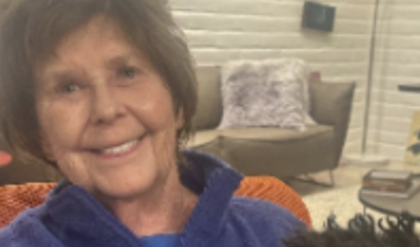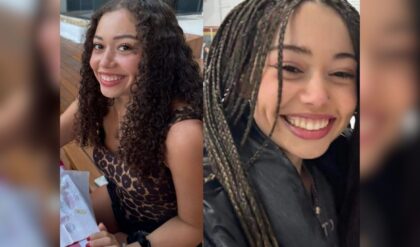
Perhaps, I’m overthinking a television show.
But given these divisive times, America’s rarely acknowledged love-hate relationship with the Spanish language — on display during NBC’s “The Voice” — needs to be discussed.
It’s an opportunity like no other to learn how we affect each other.
I’m a fan of “The Voice,” yet this season I’m both overjoyed — and annoyed.
At first, this 25-season anniversary run felt especially meaningful.
The talented contestants are a treasure trove of diversity — creatively, culturally, racially and ethnically — and in particular, Miami sensation Mafe, a 22-year-old Venezuelan immigrant, has the extraordinary mix of vocal skills to win every battle, every knockout round.
Judge John Legend fought to bring her on his team when she auditioned with a stirring, soulful rendition of one of the most iconic songs of the 20th century, “Bésame Mucho,” written by Mexican prodigy Consuelo Velázquez.
Three lines into the song, she had earned the coveted four-chair turn from all judges, the cameras capturing her parents’ tearful reaction: “¡Gracias, Dios mío!“
“I would love to have you on Team Leyenda!” Legend coaxed her.
She picked him.
Latino singers & the Queen of Country
Mafe isn’t the only contestant singing in Spanish.
There’s also Puerto Rican Madison Curbelo of Westfield, Massachusetts, who delighted with a remarkably smooth bilingual interpretation of the Ben E. King standard “Stand By Me.” And, until he lost a knockout round this week, Frank Garcia, a native of Texas who spent his early years in Mexico, also sang in Spanish, staging a dramatic performance of José José’s “El Triste.” (The Sad One).
With so much to like, where’s the sour note?
Judge country music star Reba McEntire has a habit of telling performers who sing in Spanish, even when she’s praising them, some version of “I don’t understand a word you said” — and it’s getting really old.
She did it last season, too.
I don’t understand why a person who’s otherwise kind and supportive feels obligated to keep making this point. It unnecessarily inserts an alienating factor by reminding the person that he or she is an “other,” and doesn’t quite belong.
It should go without saying: No one is expecting the Queen of Country to have any Spanish fluency. It’s not a job requirement.
This isn’t a song-writing competition.
Like the other judges, she’s there to assess the performers’ vocal abilities to reach high notes and sustain low notes, to take into account stage presence and confidence. All those things that amount to pure musical talent are universal, and certainly, transcend borders and musical genres.
The digs over singing in Spanish, which other judges have also fleetingly made, albeit with more grace, feel like a pile-on during these trying times.
We, Latinos — and especially newer immigrants, like Mafe, from our troubled hemisphere — don’t need another reminder on national television that we’re not accepted nor wanted in this “close the border” version of the United States.
Politicians and their supporters are banking on the vilification of immigrants at every turn to win elections — despite the fact that the country’s economy needs their labor and contributions. The extreme right is constantly casting immigrants as invaders to deflect from the threat that another Donald Trump presidency represents: more ugly rhetoric, a stamp of approval on xenophobia, and a threat to democratic norms.
I turn to a show like The Voice at the end of the day as an escape from all that.
I have no desire to hear a you-people type of inference, especially by a star I admire. It hurts.
No barriers
I’m sure McEntire means no disrespect.
Last year, she more gracefully handled the audition of Miami Cuban-American Juliette Ojeda, whose bilingual ballad-turned-salsa song interpretation of Olivia Newton John’s “Hopelessly Devoted To You” was called “roller-coaster” by Legend.
“You’re cute as a button. I can’t speak Spanish. Very poquito,” McEntire said. “I can only speak two languages, which is English, good and bad.”
The self-deprecation worked. She offered Ojeda expert coaching, and in exchange, McEntire added: “You can teach me how to speak Spanish.”
Perfect.
And this year, one can see her clearly enjoying the performances in Spanish. Same way I appreciate international music in foreign languages: Rhythms and harmonies move heart and soul. I don’t need to understand Italian to appreciate the operatic pop trio Il Volo or, the master, Pavarotti.
Plus, I’m sure that among fans of the 75 million records McEntire has sold worldwide, there are people who don’t understand a lick of what she’s saying.
Thankfully, in the age of cultural crossover and easily accessible Google Translate, lyrics and translations of lyrics are at our fingertips. This makes McEntire’s reminders that she can’t understand seem lazy, which we know the accomplished 69-year-old star, who has created an entertainment empire around her brand, isn’t.
The “don’t understand” also is an outdated one-liner.
For this generation, there are no language barriers.
By increasing the number of Hispanics who sing in Spanish on the show, The Voice is reflecting an operative trend in modern music: cross-cultural, multilingual collaboration.
To name a sliver of the most notable pairings: Adam Levine of Maroon Five with Colombian singer-songwriter Maluma. Puerto Rican Luis Fonsi and Justin Bieber. The Jonas Brothers and Karol G.
Incorporating singing in Spanish adds value and only makes “The Voice” all the more interesting.
What a treat it was to hear Mafe, in a competitive duo with Rivers Grayson, a 27-year-old from Huntsville, Alabama, belt out a gorgeously interlaced bilingual rendition of the 1971 classic written by Carole King and also sung by James Taylor, “You’ve Got a Friend.”
“Tu amiga fiel,” she sang in a silky voice that felt like an embrace.
Faithful friend.
Tears flowed, and yes, she won the battle — and hearts, including Reba’s.



